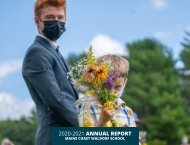You also want an ePaper? Increase the reach of your titles
YUMPU automatically turns print PDFs into web optimized ePapers that Google loves.
Our Emergence Post COVID<br />
A LETTER FROM FREDERICK VEITCH, PRESIDENT, BOARD OF DIRECTORS<br />
Embracing Each Moment of Strife<br />
A LETTER FROM JOSH LYTLE, CHAIR, COLLEGE OF TEACHERS<br />
The 20<strong>21</strong>-<strong>22</strong> school year was one<br />
of emergence and of laying the<br />
groundwork for a renewed path<br />
of sustainability and growth at Maine<br />
Coast Waldorf School. We began the year<br />
with cautious optimism that we would<br />
slowly, and eventually, regain the sense<br />
of normalcy that we had lost in the early<br />
spring of 2020. Our focus remained on<br />
evolving the COVID-19 blueprint to meet<br />
the diverse challenges we faced across<br />
our community: eligibility for vaccines was<br />
not uniform and new variants and new<br />
policies emerged seemingly every month.<br />
As they had since that fateful spring,<br />
our parents, students, teachers, and<br />
staff remained patient, kind toward one<br />
another, and undeterred in their passion<br />
to make good on our mission while slowly<br />
bringing back those aspects of the closeknit<br />
<strong>MCWS</strong> community that we had lost.<br />
At the beginning of the year, singing in<br />
classrooms and chorus had returned.<br />
As we moved into the winter, class plays<br />
were once again held in Merriconeag<br />
Hall in front of full audiences. By spring,<br />
May Faire, the Pentathlon, and a recordsetting<br />
Spring for Waldorf were back,<br />
capped off by both a fully attended Rose<br />
Ceremony and Graduation at school<br />
year’s end. It was an incredible journey to<br />
get back to where we had been before,<br />
and one that would not have happened<br />
without the perseverance and love of an<br />
entire community supporting and taking<br />
care of one another.<br />
Through this emergence, the Board of<br />
Directors worked tirelessly to address<br />
the economic hardships that these past<br />
three years have created for all who<br />
work for and attend <strong>MCWS</strong>. Higher costs<br />
of living from rent to housing prices as<br />
well as housing shortages, and inflation<br />
have all adversely impacted the ability<br />
to live, work, and send one’s children to<br />
independent private schools like ours.<br />
In addressing these issues head-on,<br />
the Board of Directors held discussion<br />
sessions with our teachers and staff<br />
throughout the year to learn firsthand<br />
what was critical for their support and<br />
sustainability. We also held numerous<br />
meetings to research and evaluate<br />
the salary and benefit structures of<br />
surrounding public and independent<br />
private schools. From this came the<br />
creation and implementation of<br />
a comprehensive overhaul of our<br />
compensation and benefits structure<br />
to ensure that everyone who works at<br />
<strong>MCWS</strong> makes a competitive wage at<br />
or above those at surrounding schools<br />
based on the same levels of educational<br />
background and experience.<br />
This plan phased in over a two-year<br />
period, not only takes into account<br />
inflation but addresses wage gap<br />
inequalities with increased health benefits<br />
to all employees. To balance these efforts,<br />
the Board was also mindful of the impacts<br />
on the costs of families sending their<br />
children to <strong>MCWS</strong>. With modest tuition<br />
increases and the implementation of a<br />
renewed five-year tuition plan, the Board<br />
sought to mediate the need for increased<br />
tuition revenue with the reality that too<br />
significant a tuition increase would be<br />
difficult for many of our families to bear.<br />
The Board’s historical financial prudence<br />
and conservative fiscal policies with a<br />
focus on carefully allocated reserves<br />
from past years’ surpluses allowed us<br />
to balance the budget this year while<br />
rolling out these essential changes to<br />
our benefits structure. With a renewed<br />
focus on the cultivation of a culture of<br />
giving in everything we do over the course<br />
of the 20<strong>22</strong>-23 school year, we remain<br />
enthusiastic and confident that the <strong>MCWS</strong><br />
community will continue its growth out of<br />
the pandemic. With your help, <strong>MCWS</strong> is on<br />
the cusp of incredible times to come.<br />
BOARD OF<br />
DIRECTORS<br />
20<strong>21</strong>-20<strong>22</strong><br />
Derek Blackburn<br />
Mary Bloch<br />
Frank Chessa<br />
Justin Corcoran<br />
Phoebe Dolan<br />
Kari Guddeck<br />
Lisa Lukis<br />
John Manganello<br />
Jeannie Mattson<br />
Karl Schatz<br />
Frederick Veitch<br />
Dan Walker<br />
Faculty Members:<br />
David Barham<br />
Chloe Dowley<br />
Josh Lytle<br />
Caitlin Pow<br />
Non-Voting Staff<br />
Lyn Baird<br />
Laura Bonarrigo<br />
David Eichler<br />
Lynne Espy<br />
Christopher Kasprak<br />
Jennifer Pochurek<br />
Melissa Watson<br />
At a recent conference, I heard<br />
Douglas Gerwin, one of the<br />
leaders of the Waldorf Education<br />
movement, speak about the concept of<br />
“strife,” which is etymologically related<br />
to “strive,” and even to “stride.” He was<br />
looking for a touchpoint to consider<br />
the current state of contemporary<br />
society and the world, which can often<br />
appear conflict-laden, polarized, and<br />
disheartening. I found these relationships<br />
of meaning quite interesting, particularly<br />
the “stride” relation–the idea of two<br />
opposing movements: of a leg pushing<br />
backward in opposition to the one moving<br />
forward, and that this forward “striving” is<br />
a result of the “strife” between these two<br />
forces of the “stride.” So often, life seems<br />
to thrive out of a series of interactions or<br />
potential contradictions.<br />
In June as this past academic year came<br />
to a close, our faculty came together<br />
for a week-long series of meetings and<br />
professional development, closing out<br />
the old year, laying certain seeds to grow<br />
and develop over the summer. Our first<br />
activity was to review the year, starting<br />
with the most recent events, and then<br />
tracing backward from event to event<br />
(literally, from that very review, into<br />
Graduation, the Rose Ceremony, etc., etc.)<br />
until we arrived back at the fall of 20<strong>21</strong>,<br />
when we had gathered together before<br />
welcoming students.<br />
It was a powerful activity to perform as<br />
an entire faculty: Early Childhood, Lower<br />
School, and High School teachers sat in a<br />
circle, thought collectively back into our<br />
year, and beheld that which we had all<br />
engaged in to create a living experience<br />
for our students, parents, and each other.<br />
There were many events from the year<br />
that were mighty positive, and a number<br />
which were flagged as in need of change<br />
and attention: together, it was the striding<br />
through positive and negative elements<br />
that collectively formed our forward<br />
striving at Maine Coast Waldorf School.<br />
This activity had particular resonance<br />
for me, as it was three years ago that my<br />
family and I arrived at <strong>MCWS</strong>, and COVID<br />
hit that very first spring. As such, this was<br />
the first year that I could see the rhythm<br />
of the year in its entirety, start to finish.<br />
Rhythm is an important part of our work<br />
as Waldorf teachers, and the rhythm of<br />
each school has its own life and flavor,<br />
unique to each location and group of<br />
individuals that comprise their community.<br />
Now, as I write this, it is early July.<br />
According to the Calendar of the Soul,<br />
which lays out a series of meditations that<br />
reflect upon the relationship of the human<br />
being to the turning of the seasons over<br />
the course of the year, summer is the<br />
time when our intellectual powers recede<br />
somewhat, becoming “dormant” in the<br />
face of our physical body and senses,<br />
which have been fully awakened. It is a<br />
way for our inner self to rest and store<br />
up its energy so that when we return in<br />
the fall, for another invigorating year of<br />
striving together, we are ready to meet<br />
both the physical and the intellectual<br />
challenges that await us. Fascinating,<br />
how elements of our being must sleep<br />
in order to expand, how these forces of<br />
conflict, opposition, and struggle are part<br />
of growing and living fully.<br />
Embracing each moment of strife we<br />
encounter in this next school year (and<br />
beyond) serves to move this School<br />
forward and allows us to continue<br />
evolving as a vibrant, flourishing Waldorf<br />
School. I’m hopeful we all keep this in<br />
mind as we strive towards a powerful new<br />
year of possibilities!<br />
COLLEGE<br />
OF TEACHERS<br />
20<strong>21</strong>-20<strong>22</strong><br />
Josh Lytle<br />
Johanna Flath<br />
Nancy Goldberg<br />
Helen-Ann Ireland<br />
Jeff O’Brien<br />
David Barham<br />
Caitlin Pow<br />
Margaret Samuelson<br />
Cerridwen McQueen<br />
Lauren Kerr<br />
Jill Fox<br />
Lynn Thurrell<br />
Marta Rackmales<br />
Michael Fenderson<br />
Ezra Smith<br />
Chloe Dowley<br />
Lynn Wetterhorn<br />
Melissa Watson<br />
David Eichler<br />
2 MAINE COAST WALDORF SCHOOL 20<strong>21</strong>-20<strong>22</strong> ANNUAL REPORT 3









